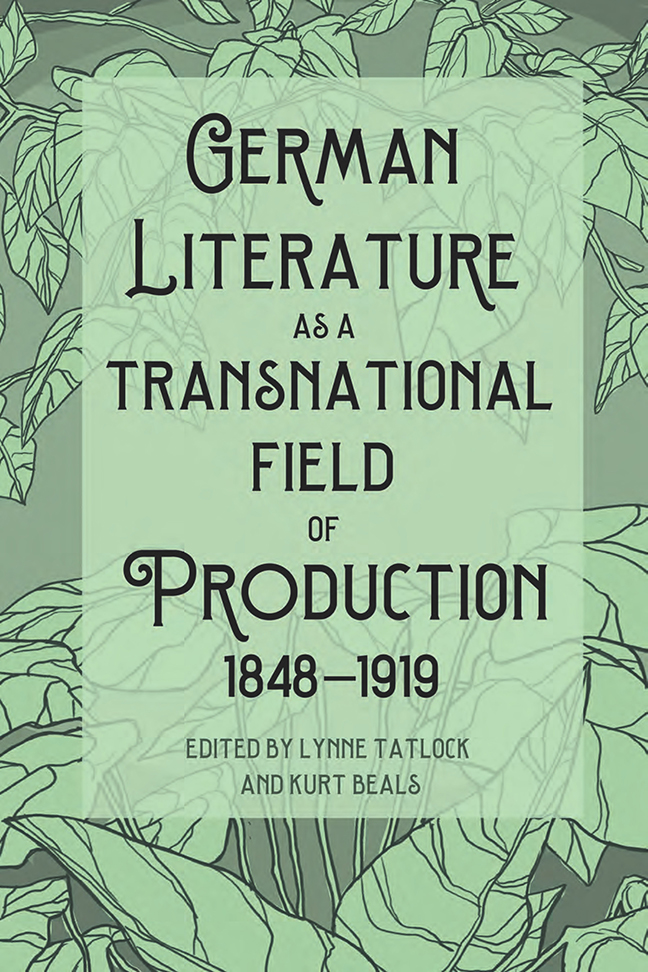Book contents
- Frontmatter
- Contents
- Acknowledgments
- Introduction: A Transnational Literary Field in the Age of Nationalism
- 1 The Passion of Johannes Scherr: Historiography as Trauma
- 2 Between Integration and Differentiation: On the Relationship between German and Austrian Literature in the Second Half of the Nineteenth Century
- 3 Reading Stifter in America
- 4 Travel Writing and Transnational Marketing: How Ida Pfeiffer brought the World to Austria and Beyond
- 5 Ernst Brausewetter's Meisternovellen Deutscher Frauen (1897–98): Gender, Genre, and (Inter)National Aspiration
- 6 Arbiter of Nation? The Strange Case of Hans Müller-Casenov's The Humour of Germany (1892/1893)
- 7 Visualizing the End: Nation, Empire, and Neo-Roman Mimesis in Keller and Fontane
- 8 Eurocentric Cosmopolitanism in Thomas Mann's Buddenbrooks
- 9 European Peace from a Transatlantic Perspective: Victor Hugo and Bertha von Suttner
- 10 Hermann Graf Keyserling and Gu Hongming’s Ethics of World Culture: Confucianism, Monarchism, and Anti-Colonialism
- 11 Constructing Symphonic Worlds: Gustav Mahler, Weltliteratur, and the Musical Program
- 12 The Garb of National Literature: Transnational Identities and the Early Twentieth-Century Schriftstreit
- 13 From European Symbolism to German Gesture: The International and Transnational Nationalism of Stefan George's Blätter für die Kunst
- 14 Canon Fire: Dada's Attack on National Literature
- Selected Bibliography
- Contributors
- Index
1 - The Passion of Johannes Scherr: Historiography as Trauma
Published online by Cambridge University Press: 10 January 2024
- Frontmatter
- Contents
- Acknowledgments
- Introduction: A Transnational Literary Field in the Age of Nationalism
- 1 The Passion of Johannes Scherr: Historiography as Trauma
- 2 Between Integration and Differentiation: On the Relationship between German and Austrian Literature in the Second Half of the Nineteenth Century
- 3 Reading Stifter in America
- 4 Travel Writing and Transnational Marketing: How Ida Pfeiffer brought the World to Austria and Beyond
- 5 Ernst Brausewetter's Meisternovellen Deutscher Frauen (1897–98): Gender, Genre, and (Inter)National Aspiration
- 6 Arbiter of Nation? The Strange Case of Hans Müller-Casenov's The Humour of Germany (1892/1893)
- 7 Visualizing the End: Nation, Empire, and Neo-Roman Mimesis in Keller and Fontane
- 8 Eurocentric Cosmopolitanism in Thomas Mann's Buddenbrooks
- 9 European Peace from a Transatlantic Perspective: Victor Hugo and Bertha von Suttner
- 10 Hermann Graf Keyserling and Gu Hongming’s Ethics of World Culture: Confucianism, Monarchism, and Anti-Colonialism
- 11 Constructing Symphonic Worlds: Gustav Mahler, Weltliteratur, and the Musical Program
- 12 The Garb of National Literature: Transnational Identities and the Early Twentieth-Century Schriftstreit
- 13 From European Symbolism to German Gesture: The International and Transnational Nationalism of Stefan George's Blätter für die Kunst
- 14 Canon Fire: Dada's Attack on National Literature
- Selected Bibliography
- Contributors
- Index
Summary
And till my ghastly tale is told,
This heart within me burns.
—Coleridge, “Rime of the Ancient Mariner”I take the title of this essay from Barbara Branden's book The Passion of Ayn Rand. No kidding! Rand and Scherr have more in common than we might think: both were émigrés who escaped oppressive political situations and who argued passionately for freedom and democracy and against tyranny and cronyism. Both had passionate, intertwined interests in politics and culture and both published literary and critical works that they thought of as expressions of a basic political philosophy. Both produced work—and here we arrive at the kernel of what I wish to argue here—that was motivated and shaped by their having been traumatized by political catastrophes that were opposite in nature: for Rand the “successful” Russian Revolution and for Scherr the failed German 1848 revolution, which caused him to live over half his life in exile from 1849 to his death in 1886. Indeed, Scherr framed the defeat of democratic forces in the 1848 revolution in literally dramatic terms in his work 1848: Ein weltgeschichtliches Drama (1848: A World-Historical Drama, 1875). And that's not all: Scherr gave his account of the disastrous French invasion of Mexico from 1862 to 1868 the title Die Tragödie in Mexico (The Tragedy in Mexico), while his collection of sketches from world history was called Menschliche Tragikomödie (Human Tragicomedy). In 1868, he published a book with the subtitle Das Passionsspiel von Wildisbuch (The Passion Play of Wildisbuch). Like Coleridge's Ancient Mariner, Scherr kept retelling the same story again and again—in 1850, in 1868, in 1875—expanding its world-historical importance with each repetition. Unlike Scherr, Rand did not venture into literary history, other than by claiming to understand what Romanticism was and how American collectivism had killed it except in its “bootleg” products such as police procedurals. Unlike Rand, Scherr did not try to create a new philosophy. My focus here will be on Scherr as literary and cultural historian and on how his own trauma and that of Germany cast its shadow across a significant portion of his endeavors.
I use the term “passion” to indicate an effect of trauma that hinders or redirects the goals of historiography or of literary criticism. In Ronald Ruden's formulation, which he used as a book title, psychic trauma creates a situation “when the past is always present.”
- Type
- Chapter
- Information
- Publisher: Boydell & BrewerPrint publication year: 2023



